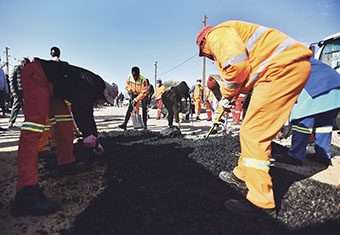There are two critical numbers to watch in the upcoming Budget Speech as the government, National Treasury, and Minister of Finance Enoch Godongwana seek to successfully chart a narrow path for the country’s finances through difficult terrain.
Following significant shortfalls in expected public income from tax revenue, these are the country’s budget deficit and its debt-to-GDP (gross domestic product) ratio.
Notably, both were revised upwards in the November 2023 medium-term budget policy statement (MTBPS), as a weak global environment and local energy and infrastructure challenges weighed heavily on the economy.
Consequently, the Treasury estimated that tax revenue would total R56.8-billion more than planned in 2023–2024, with a further R121.1-billion shortfall over the next two years.
The economy is under pressure
As a result, the forecast budget deficit has been revised from 4% in the 2023 Budget to 4.9%, while public debt as a percentage of GDP has been revised upwards to peak at 77.7% in 2025/26 rather than 73.6%, moving dangerously closer towards a debt trap.
This is a sharp increase from the 70.9% debt-to-GDP ratio seen in 2022/2023 and an even sharper incline from the 53.3% ratio seen in 2017/18, demonstrating the real impact of the pandemic era and ongoing macroeconomic shocks and weaknesses.
South Africa’s economy is under enormous pressure, and the Treasury must now walk a tightrope to strike a balance between the immense demands placed on the fiscus, the budget deficit, and rising debt levels before these get out of hand.
If we do not take the necessary steps soon, we may end up on a road that leads to the IMF door, asking for a bailout.
This must be avoided at all costs.
Now is the right time to rein in spending where possible, better manage our debt and cost-to-service obligations, and improve the government’s revenue collection capacity.
Options to address the budget shortfall
Higher debt leads to weaker spending power as debt servicing costs absorb a growing slice of the budget.
Rising debt levels are already impacting what the government can spend on other crucial services such as healthcare, education, infrastructure development, and national security.
South Africa must either reduce its debt obligations, which is difficult to do given the vast need in our country, or increase its available income by stimulating economic growth and generating more tax revenue, which is also not an easy task.
If debt levels rise too high in any given country, that country may choose to enact certain austerity measures, such as cutting spending in certain sectors or increasing taxes.
But as 2024 represents an important election year, and seeing as the economy and households are already under strain, with tax rates close to their upper limits, I do not see an increase in taxes coming from the upcoming Budget Speech.
Significant cuts to spending are also unlikely, as the government needs to continue spending in productive areas of the economy to create jobs, stimulate trade, encourage investment, and ultimately grow our GDP.
Revenue-collection capacity
For example, to realise the country’s full growth potential, the government must continue to build and upgrade roads and bridges; improve and expand the country’s transportation networks, particularly our rail system; revitalise old city centres; provide bulk infrastructure to underdeveloped areas; and stabilise the energy grid.
A potentially compelling option that avoids cutting spending or raising taxes is simply to improve the government’s revenue-collection capacity by further empowering the South African Revenue Service (SARS).
Improving SARS’ capacity to collect outstanding taxes, address tax evasion and non-compliance, streamline tax collection processes to reduce operational costs, and give it greater authority to crack down on tax-related crimes could add significantly to the country’s budget.
Consolidation of capital budgets
Another critical measure that should be considered is the consolidation of South Africa’s capital budgets and conditional grant frameworks.
A large number of capital budgets and grants, generally used for long-term investments into, for example, infrastructure projects or housing conditional grants, are controlled and granted by provincial and national departments with little or no collaboration or coordination.
These should be consolidated and rationalised to ensure that funding is allocated to initiatives with the maximum potential economic impact and that they support those most in need.
The only certainty is that we will see the impacts of the upcoming elections on the budget. But the details remain uncertain, as the Treasury will need to come up with some surprises to balance the risks and ensure the strength of South Africa’s fiscal position and sustainability in the long term.
There won’t be any easy answers, but there are potential options to consider, and there is reason for hope, as the Treasury has successfully navigated many difficult roads before.
Dondo Mogajane, the chief executive of Moti Group, is a former director-general of the National Treasury.



